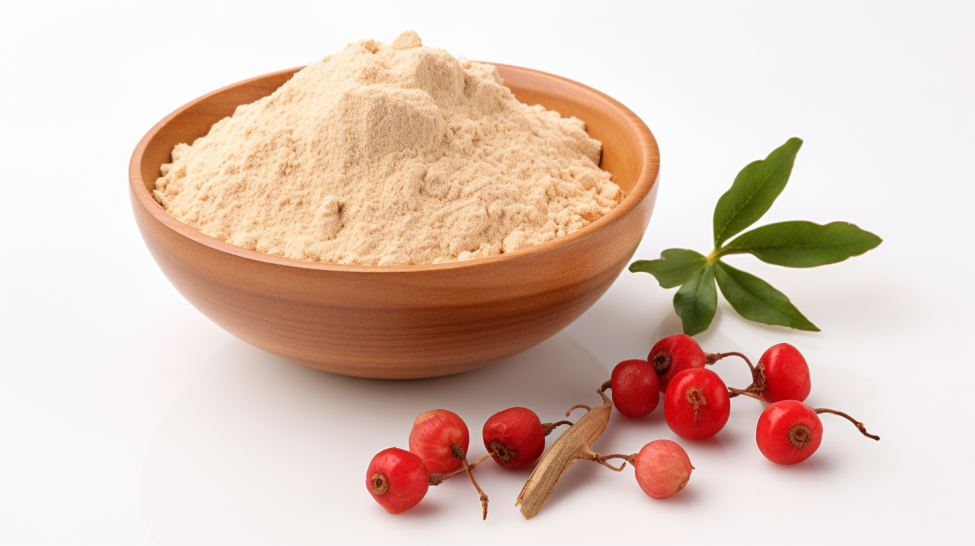Ashwagandha, also known as Withania somnifera or Indian ginseng, is a powerful herb that has been used in traditional Ayurvedic medicine for centuries. Its name is derived from the Sanskrit words "ashva" (meaning horse) and "gandha" (meaning smell), hinting at its strong aroma and its ability to impart strength and vitality to the body. In recent years, ashwagandha has gained popularity in the Western world for its potential to promote calmness and inner balance.

Understanding Ashwagandha: An Overview
Before delving into the benefits of ashwagandha, it's important to understand what exactly this herb is. Ashwagandha is a small shrub native to India, the Middle East, and parts of Africa. Its roots and berries are used to create various forms of supplements, including capsules, powders, and teas.
What is Ashwagandha?
Ashwagandha is classified as an adaptogenic herb, meaning it helps the body adapt to stressors and maintain balance. It is believed to work by modulating the body's stress response system, which includes the hypothalamus, pituitary gland, and adrenal glands.
The Historical Use of Ashwagandha
Ancient Ayurvedic texts describe ashwagandha as a potent herb for promoting overall health and longevity. It was traditionally used to support the immune system, enhance energy levels, and improve cognitive function. Ashwagandha was also valued for its ability to promote restful sleep and reduce anxiety.
Ashwagandha's historical use dates back thousands of years in Ayurvedic medicine. In ancient India, it was highly revered for its rejuvenating properties and was often referred to as the "Indian ginseng." The herb was believed to restore vitality and strength, making it a popular choice among warriors and athletes.
Ashwagandha was not only used internally but also externally. It was commonly applied topically as a paste or oil to promote healthy skin and hair. The herb was believed to nourish the scalp, promote hair growth, and improve the overall texture and appearance of the hair.
Throughout history, ashwagandha has been regarded as a powerful adaptogen. It was used to help the body cope with physical and mental stress, promoting resilience and balance. Whether it was the demands of a physically demanding lifestyle or the pressures of daily life, ashwagandha was trusted to support the body's natural ability to adapt and thrive.
Ashwagandha's reputation as a stress reliever and mood enhancer also made it a popular choice for promoting mental well-being. It was believed to calm the mind, reduce anxiety, and support a positive mood. Many ancient texts praised ashwagandha for its ability to bring clarity and focus to the mind, making it a valuable herb for meditation and spiritual practices.
As time went on, ashwagandha's popularity spread beyond India. It became known as an important herb in traditional medicine systems across the globe. Its reputation as a natural way to support overall health and well-being caught the attention of researchers, leading to numerous scientific studies exploring its potential benefits.
Today, ashwagandha continues to be widely used and studied for its many potential benefits. From its traditional use as an immune booster and energy enhancer to its modern applications in stress management and cognitive support, ashwagandha remains a highly regarded herb in the world of natural health.
The Science Behind Ashwagandha
Ashwagandha, an ancient herb, has been used for centuries in traditional medicine for its various health benefits. While ancient wisdom is valuable, modern research has shed light on the mechanisms through which ashwagandha exerts its effects.
Ashwagandha contains bioactive compounds called withanolides, which have been shown to modulate various neurotransmitter pathways in the brain. These withanolides interact with receptors in the brain, such as GABA receptors, which are responsible for reducing neuronal excitability. By modulating these pathways, ashwagandha can result in reduced stress and anxiety, improved mood, and enhanced cognitive function.
Furthermore, ashwagandha has been found to have antioxidant properties. Oxidative stress, caused by an imbalance between free radicals and antioxidants in the body, can lead to various health issues. Ashwagandha's antioxidant properties help neutralize these free radicals and protect cells from damage.
Scientific Studies Supporting Ashwagandha's Benefits
Several scientific studies have demonstrated the potential benefits of ashwagandha. For example, a randomized controlled trial published in the Journal of Alternative and Complementary Medicine found that ashwagandha supplementation led to significant reductions in stress and cortisol levels compared to a placebo. The study involved participants who reported high levels of stress and anxiety, and the results indicated that ashwagandha could be an effective natural remedy for managing stress.
Another study published in the Indian Journal of Psychological Medicine showed that ashwagandha supplementation improved symptoms of depression and anxiety in individuals with a diagnosed mood disorder. The participants who took ashwagandha experienced a significant reduction in their symptoms compared to those who received a placebo. This suggests that ashwagandha could be a valuable addition to the treatment of mood disorders.
In addition to its effects on stress and mood, ashwagandha has also been studied for its potential benefits in improving physical performance. A study published in the Journal of the International Society of Sports Nutrition found that ashwagandha supplementation improved strength and muscle recovery in healthy individuals who engaged in resistance training. This suggests that ashwagandha may have potential as a natural performance enhancer for athletes and fitness enthusiasts.
Furthermore, research has shown that ashwagandha may have anti-inflammatory properties. Chronic inflammation is a common underlying factor in many chronic diseases. By reducing inflammation, ashwagandha may help prevent or manage conditions such as arthritis, heart disease, and certain types of cancer.
The scientific studies conducted on ashwagandha provide promising evidence for its various health benefits. However, it is important to note that more research is needed to fully understand the mechanisms of action and to determine the optimal dosage and duration of supplementation.
Ashwagandha and Mental Health
One area in which Ashwagandha shows promise is in promoting mental health and well-being.
Ashwagandha, also known as Withania somnifera, is an ancient herb that has been used for centuries in Ayurvedic medicine to support various aspects of health. Its adaptogenic properties make it particularly beneficial for mental health.
Ashwagandha for Stress and Anxiety
Stress and anxiety have become prevalent issues in today's fast-paced world. The demands of work, relationships, and daily life can take a toll on our mental well-being. Fortunately, ashwagandha may offer a natural solution for managing these conditions.
Ashwagandha works by reducing cortisol levels, the hormone responsible for the body's stress response. By modulating neurotransmitter activity, particularly GABA, serotonin, and dopamine, ashwagandha can help promote a sense of calm and relaxation. These neurotransmitters play a crucial role in regulating mood and emotions, and imbalances can contribute to anxiety and stress.
Several studies have shown promising results in using ashwagandha to manage stress and anxiety. In a randomized controlled trial, individuals who took ashwagandha extract experienced significant reductions in stress and anxiety levels compared to those who received a placebo.
Another study found that ashwagandha supplementation improved stress resilience and reduced anxiety symptoms in individuals with a history of chronic stress.
Ashwagandha for Depression and Mood Disorders
Depression and mood disorders can significantly impact a person's quality of life. The persistent feelings of sadness, loss of interest, and lack of energy can make even the simplest tasks feel overwhelming. While there are various treatment options available, ashwagandha's adaptogenic properties make it a potential adjunct therapy for individuals struggling with these conditions.
Research suggests that ashwagandha can help regulate neurotransmitter imbalances commonly seen in depression and anxiety. It has been found to increase serotonin levels, a neurotransmitter known as the "happy hormone," which plays a crucial role in mood regulation.
Additionally, ashwagandha may enhance the function of GABA receptors in the brain, which can have a calming effect on the nervous system.
A study published in the Journal of Alternative and Complementary Medicine found that ashwagandha supplementation significantly reduced symptoms of depression in individuals with major depressive disorder. Another study demonstrated that ashwagandha extract was as effective as a commonly prescribed antidepressant medication in reducing symptoms of depression and anxiety.
It is important to note that while ashwagandha shows promise in promoting mental health, it should not replace conventional treatment for severe mental health conditions. It is always recommended to consult with a healthcare professional before incorporating any new supplements or treatments into your mental health regimen.
Ashwagandha for Physical Health
The benefits of ashwagandha extend beyond mental health and into the realm of physical well-being. In addition to its well-known effects on reducing stress and anxiety, ashwagandha has also been found to have numerous positive impacts on the body.
One of the key areas where ashwagandha shines is in boosting immunity. A healthy immune system is essential for overall wellness, as it helps protect the body from harmful pathogens and diseases.
Research has shown that ashwagandha can enhance immune response by increasing the activity of natural killer cells. These cells play a crucial role in the body's defense mechanism, as they are responsible for identifying and eliminating harmful pathogens, as well as cancer cells.
Furthermore, ashwagandha has been found to support hormonal balance, which is vital for maintaining optimal physical health. Hormonal imbalances can lead to a variety of health issues, including fatigue, weight gain, and mood swings. Ashwagandha has shown promising results in regulating the production of cortisol, thyroid hormones, and sex hormones, thereby promoting hormonal equilibrium.
By reducing cortisol levels, ashwagandha helps combat stress and its detrimental effects on the body. Chronically elevated cortisol levels can contribute to weight gain, high blood pressure, and weakened immune function. Ashwagandha acts as an adaptogen, helping the body adapt to stress and promoting a healthy stress response.
Additionally, ashwagandha has been found to have anti-inflammatory properties. Chronic inflammation is associated with various health conditions, including heart disease, diabetes, and autoimmune disorders. Studies have shown that ashwagandha can help reduce markers of inflammation in the body, thereby potentially lowering the risk of developing these chronic diseases.
Moreover, ashwagandha has been researched for its potential benefits in promoting muscle strength and recovery. It has been found to increase muscle mass and improve muscular strength, making it a popular supplement among athletes and fitness enthusiasts.
Overall, ashwagandha's positive effects on physical health make it a valuable addition to one's wellness routine. From boosting immunity and supporting hormonal balance to reducing inflammation and promoting muscle strength, ashwagandha offers a myriad of benefits for those seeking to enhance their physical well-being.
Different Forms of Ashwagandha: Capsules, Powder, and Tea
Ashwagandha is available in different forms, each with its own advantages. Capsules offer convenience and precise dosing, while powders can be mixed with high-caffeine beverages to create a perfectly-balanced boost without jitteriness. Ashwagandha tea provides a relaxing and enjoyable way to incorporate this herb into your routine.
In conclusion, ashwagandha is a remarkable herb with a long history of use in traditional medicine. Scientific research supports its potential to promote calmness and inner balance, making it a valuable addition to any wellness routine. Whether you're looking to manage stress and anxiety, improve mood, and boost cognitive function, Leonhart High Caffeine Coffee Mix & Hot Chocolate might be a great choice to master your day.







